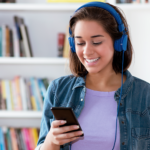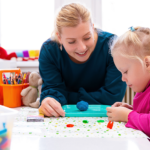We hear a lot about SEL these days. It’s the buzziest buzzword in all of education. Everywhere you turn there is another article, webinar, or expert explaining the benefits of focusing on the social and emotional needs of students. Yes, students’ mental health has taken a big blow with Covid. Yes, we need to tend to that need with compassion and care.
AND those exact words are also true for educators. Educators’ mental health has taken a big blow with Covid and this needs tending to with compassion and care.
What does the data say? According to the Merrimack College Teacher Survey, 44% of teachers say they are likely to leave the profession, up from 29% in 2011. And for principals, the news is no better. The National Association of Secondary School Principals (NASSP) survey states that 45% of school leaders report the pandemic has accelerated their plan to leave the profession.
And, in terms of anecdotal data, the stories are everywhere. In my role as an educational consultant, I travel to schools around the country to support building a school-wide SEL framework. From the mountains of West Virginia to the coast of California, the message of educators is the same: THIS IS A HARD YEAR.
Adult SEL is a tool that can help.
Adult social and emotional learning is about supporting educators and their mental health, and helping them build the skills to cultivate calm, caring and compassionate classrooms where learners can thrive. Though it is a relatively new field, it is something great school leaders have been focusing on since John Dewey.
Here Are Five Self-Care Strategies to Try This Summer
#1. REFLECT
Too often, given the pace of life, we don’t have time to think for even a minute about the past school year. This is a missed opportunity to integrate and reflect on what has happened. Reflection is a great way to process the past, celebrate our joys, and learn from our mistakes.
This integration can serve to help us untangle some effects of the year, and also counter any negative bias we may have to sift through to find hidden successes.
This could be done in a staff meeting on a collective level, or journaling on a personal level.
Action Step:
A good way to start this is with some questions
- What was hard for me about this year?
- What is something I feel good about?
- What is a big takeaway to guide me in the future?
#2. RELAX
Our bodies are not meant to be on all of the time. Summer is the time to take off the armor of our amygdala’s fight or flight and put on the breezy coat of relaxation.
The hypervigilance needed to survive the school year can have negative health outcomes if we don’t take the time to relax both our bodies and our minds.
When I was a principal, mindfulness was a conduit that helped me find moments of presence and relaxation. It became a sort of life jacket for me to provide support when swimming in challenging waters.
Mindfulness can be defined as being present in the moment with awareness. For me, mindfulness, along with gratitude, compassion, and grace are all things that can make life a bit richer and more meaningful.
Action Step:
- Meditation is a place to start. Starting our day with even five minutes of focused breathing can serve to settle our nervous system and calm our bodies.
#3. RELATIONSHIPS
During the busy time of the year, we often put important relationships on the back burner. Whether that relationship is with our partner, parent, or child, these relationships can begin to wither without proper attention.
Prioritizing doctor appointments, working out, catching up on our favorite shows, or trying out a new recipe can all serve to bring us back to our authentic selves.
Summer is a time to turn toward essential relationships in our lives with mental energy and attention while holding it all with a soft touch.
Action Step:
- Think about the relationships that may need more attention and ask yourself, “What steps could I take to move toward this relationship?”
#4. REST
Think of this school year as a long drive. Just like there are rest areas on the highway, when we are driving long distances, we need time to get off the road, out of the car, and stretch our legs. Rest.
Breathe, lay in a hammock, read a book, or simply do nothing. The busy frenetic life of our school year must be replaced with the calm, easy pace of summer.
Often, educators are experiencing the cumulative effect of sleep deprivation. This can have harmful effects on our whole body, from inflammation to brain fog and everything in between.
And rest is not just sleeping. According to Saundra Dalton Smith, there are 7 different types of rest: Physical, Mental, Spiritual, Sensory, Emotional, Creative, and Social. And a deficiency in any of these areas can have negative consequences.
Action Steps:
- Ask yourself, “How rested do I feel?”
- What gets in the way of you feeling rested?
- Take some time to think about what rest you need most and make it happen.
#5. RECHARGE
Summer renewal is not just a passive activity. It is also about stepping into those things that make us feel alive and bring joy and a spark to our hearts.
For me, this looks like many different things: playing pickleball on a Saturday morning, hanging out with friends on Friday night, or simply getting lost with a good book.
These things do not take from me, they serve to fill me up, recharge me and bring in new fresh energy.
Action Steps:
- Ask yourself, “What helps me recharge?”
- Make a list and do the things that bring you joy this summer.
Think of the summer like a solar panel. Solar panels are used to store energy. This energy is stored in order to power something at a later time.
This is what summer can be for educators—a time for healing from a difficult year.
A time to relax, reconnect relationships, rest, and recharge our batteries.
A rested educator in the summer is a better educator in the fall.
A side note for district leaders: Often educators take time in the summer to build their skills in literacy, or the new math curriculum, but this summer needs to be different. Given the taxing nature of the school year, district leaders need to think of the summer differently, more as an intentional time of healing and hope for educators and less as a time to gain new teaching strategies.
A side note on self-care: To clarify, when I talk about self-care, I recognize and acknowledge there are many educational systems that need to be examined, and processes and resources that need to be added to provide more support for educators. For today’s journey, I am choosing to focus on what we can control.






